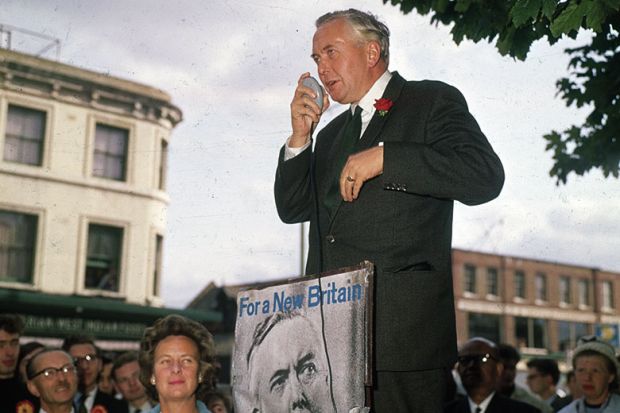In the modern world, prime ministers are seen as all-powerful figures, yet most premierships end in tears. Margaret Thatcher and Tony Blair were driven out by their own MPs, Gordon Brown and John Major by the voters in elections and David Cameron by the voters in a referendum. Of post-war British premiers, only one – Harold Wilson – left entirely voluntarily and at a time of his choosing. How is this paradox – that of seemingly all-powerful figures, yet driven from office by others – to be explained? That is the question that Patrick Weller, emeritus professor at Griffith University in Brisbane, seeks to answer in The Prime Ministers’ Craft.
He brings two essential qualities to the task. The first is an understanding that Westminster is by no means the only example of Cabinet government, a form that has been replicated in much of the Commonwealth. Weller, therefore, does not confine his attention to Britain, but also examines three other systems “that share a common DNA” with Britain – Canada, Australia and New Zealand.
The second is a historical perspective often lacking in those who complain of “prime ministerial government”. They forget that Arthur Balfour, in power from 1902 to 1905 and not often thought of as a “strong” prime minister, summarily sacked three free trade ministers in 1903, and that Gladstone drafted his first Home Rule bill in 1886 without showing it to most of his Cabinet. When the Duke of Wellington became prime minister in 1828, he found Cabinet government, as a former military man, a strange experience, complaining that “I gave them their orders, and they stayed around to discuss them.” Weller suggests that the first British prime minister, Sir Robert Walpole, was attacked for accumulating too much power, ignoring his colleagues and refusing to listen to their advice. Plus ça change.
Those who criticise today’s prime ministers for accumulating too much power seek, so Weller believes, “a nostalgic return to the ‘good old days’, when, first, Cabinet government prevailed, and second and crucially, when their countries were (apparently) so much better governed”. “Both propositions”, Weller believes, “are nonsense.” There never was such a golden age.
Prime ministers, Weller shows, hold office more tenuously than many imagine, but the main threats to them come from the voters or from their party, not from the Cabinet. It is rare for a Cabinet to dethrone a prime minister. For, even if ministers were to agree that a prime minister should go, they will not agree upon a successor. Every Cabinet contains members with prime minister’s batons in their knapsacks. Many years ago, Enoch Powell described the disintegration of Harold Macmillan’s premiership in the early 1960s: “You lose the public, you lose the press, you lose the party in the House, but the men whose heads you can cut off before breakfast you lose last. The most difficult operation there is for a Cabinet is to depose a prime minister. So it was everything else that slipped around Harold Macmillan before the Cabinet itself.” The same was true with the defenestration of Margaret Thatcher in 1990. Cabinet ministers were the last to appreciate how unpopular she had become.
Weller’s most fascinating chapter is on how prime ministers reach what Disraeli called “the top of the greasy pole”. There are two routes: winning an election and replacing an incumbent from one’s own party. (David Cameron is an example of the first, Theresa May of the second.) The tenure of office of those who replace incumbents is far shorter than those who win power through elections. Over the past 30 years, 16 prime ministers from the four countries featured have come to power by winning elections and 13 by replacing incumbents. Only four of the latter have won elections. They include Australia’s Malcolm Turnbull, who held on by a single seat in 2016, and May, who lost her majority last year.
The security of tenure of prime ministers is in large part determined by the rules of party leadership elections. Paradoxically, extending the electorate to include party members in addition to MPs makes it more difficult to remove an unpopular leader. This was shown in the Labour Party in June 2016 when its MPs voted no confidence in Jeremy Corbyn by 172 votes to 40, but Corbyn refused to resign, citing his support in the party outside Parliament. In Canada, where leaders are elected by party conventions, prime ministers John Diefenbaker and Pierre Trudeau survived long periods of unpopularity and proved almost unassailable. In Australia, by contrast, where leaders are elected by parliamentary parties, a coup can be mounted at a moment’s notice, as three recent prime ministers – Kevin Rudd, Julia Gillard and Tony Abbott – discovered.
May seems safer than her Australian counterparts because, if she survives a leadership challenge, no further challenge can be mounted for at least a year – and, were she to be defeated, her successor would be elected by the party outside Parliament. The campaign would probably be protracted and bitter and cost the party much electoral support. Most Conservative Party MPs, therefore, regard removing an incumbent prime minister as very much a last resort. It is likely to occur only, so Weller believes, when crisis and opportunity coincide, as happened when Geoffrey Howe resigned from Thatcher’s government in 1990 and enabled Michael Heseltine to challenge her, promising to repeal the hated poll tax.
The remaining chapters of The Prime Ministers’ Craft are less original, dealing with the tired debates about matters such as collective responsibility and prime ministerial advisers. There is, however, an interesting discussion of whether Britain, as Weller believes, should institute a Prime Minister’s Department: a source of advice independent of other government departments, utilised by the other three countries he examines. Perhaps the Cabinet Office, the Prime Minister’s Office and the various attached agencies constitute a Prime Minister’s Department in all but name, but an inadequately coordinated one. A former Cabinet secretary told Weller that all four of the very different prime ministers he had served were dissatisfied with the central machinery of government. Some Cabinet secretaries have, of course, acted as if they were permanent secretaries of a Prime Minister’s Department, rather than servants of the Cabinet as a whole. One former Cabinet secretary offered a solution to the conundrum worthy of Sir Humphrey in the television series Yes Minister by telling Weller that he was secretary of the Cabinet but to the prime minister.
Weller does not really answer the question he poses of why some prime ministers succeed and others fail, concluding lamely that “there can be no cross-national handbook for prime ministers”. The only generalisation that can safely be made is that the power of prime ministers rests primarily upon the vicissitudes of politics and electoral behaviour. Thatcher and Blair enjoyed the full plenitude of power after their landslide electoral victories of 1983, 1987, 1997 and 2001, respectively. Major lost it when the voters reduced his majority from 102 to 21 in 1992, and May lost it last year. If our leaders are too “strong” and dictatorial, or too “weak” and failing to provide leadership, the blame lies with us, not with them. For it is we, the people, who decide by our votes how powerful our prime ministers are to be.
Vernon Bogdanor is professor of government at King’s College London. His latest book, Brexit, the Constitution and the Future of the United Kingdom, will be published by I. B. Tauris next year.
The Prime Ministers’ Craft: Why Some Succeed and Others Fail in Westminster Systems
By Patrick Weller
Oxford University Press
288pp, £60.00
ISBN 9780199646203
Published 30 May 2018
The author
Patrick Weller, professor emeritus in the School of Government and International Relations at Griffith University in Australia, read history at Exeter College, Oxford. After graduating, he recalls, he “decided to go somewhere else for a couple of years. As Canada House was closed and Australia House was open the day I was in London, I ended up going to Australia as a £10 migrant, with every intention of returning to the UK after two years. That was in 1966. Although I come back every year (my mother turns 100 in October), by the time the two years were up I had started working as an academic and have continued to do so ever since.”
Although Weller initially taught history, he gained a PhD in political science at the Australian National University and began researching the central government. He became “really hooked” when he was “writing a study of Malcolm Fraser as prime minister (1975-83) and he gave me access to all the Cabinet documents of his government a mere two years after it ended”.
Adopting the comparative approach of his new book, says Weller, “allows us to understand where the unique components in each country are and what difference they make. It allows us to see how practices have worked elsewhere, not necessarily as an example to follow but as an experiment from which we can learn (and often as a cautionary tale). I like the comment that we study other countries to better understand our own.”
Studying history, in Weller’s view, can also help us avoid “look[ing] at current events with a breathless horror that implies everything is new, that the current rulers are more cynical, power-hungry and unscrupulous than any of their predecessors, who worked in a golden age when they were logical, reasonable etc. That golden age is always just far enough away to be beyond memory and description, and is never precisely identified.”
Matthew Reisz
POSTSCRIPT:
Print headline: To reach the top and stay there
Register to continue
Why register?
- Registration is free and only takes a moment
- Once registered, you can read 3 articles a month
- Sign up for our newsletter
Subscribe
Or subscribe for unlimited access to:
- Unlimited access to news, views, insights & reviews
- Digital editions
- Digital access to THE’s university and college rankings analysis
Already registered or a current subscriber?








